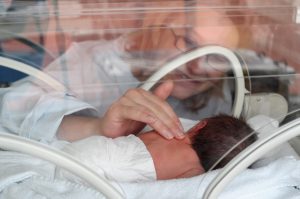There are some rooms in a hospital you want to avoid. Ideally, the hospital stay in your adoption only involves the waiting room and, maybe, a visit to the birthing suite. Unfortunately, some parents find themselves standing in a different ward.
The NICU (Neonatal Intensive Care Unit) is a nerve-racking place. When you put those nerves on top of what you are already feeling — you’re about to meet your baby for the first time, after all — the experience can be overwhelming. And let’s add a third factor to this whole situation: most hopeful parents have no idea what to expect when adoption involves the NICU. This, most likely, wasn’t part of your plan.
What’s happening? What are you supposed to do? What are the rules here?
 Adoption when baby goes to the NICU can be a challenging time. But there’s still reason for hope. In 25 years of service, American Adoptions has seen almost every situation possible. That means we have helped plenty of hopeful adoptive parents navigate complicated emotions when baby is in the NICU.
Adoption when baby goes to the NICU can be a challenging time. But there’s still reason for hope. In 25 years of service, American Adoptions has seen almost every situation possible. That means we have helped plenty of hopeful adoptive parents navigate complicated emotions when baby is in the NICU.
Here’s what to expect, and some things to keep in mind, when baby goes to the NICU during your adoption.
First Sight Can Be Scary
Any baby in the NICU is dealing with some sort of specialized medical issue. They are not, in that moment, well. And that usually means a bevy of tubes, wires and IV lines will be attached to their little body. There’s a chance this is what your baby will look like the first time you see them, and that can be scary.
Keep this in mind, because it will be a lot less scary if you’re expecting it. Also remember that this is normal for a baby in the NICU. All those wires will come off eventually. As much as is possible, a positive attitude is vital for your own mental health during the NICU stay. Starting off with a scare won’t help, so be ready for what you’ll see.
The Length of Stay May Vary
The reason for your baby’s admission to the NICU will determine the length of the stay. Some pre-mature babies stay for two to three weeks, while others may stay for months. Babies who are recovering from in-utero drug use vary from weeks to months as well.
What does this mean for you? If your adoption is in-state, and you live nearby, this is easier to handle. It means a lot of nights spent at the hospital, but you can probably maintain a normal life schedule around that. If, however, you traveled to the hospital because the birth mother is in a different state, then this becomes more difficult. The primary earner of the household will most likely need to return to work, while the other partner should attempt to stay, if possible.
An unspecified amount of time away from family and out-of-state is not what anyone wants. But, during this time, it’s what is best for your baby and the adoption process. We understand how difficult this can be emotionally and logistically. Lean on your adoption specialist and your loved ones for support during this time.
Stick to the Hospital Plan
The hospital plan is one of the most important parts of a prospective birth mother’s adoption plan. It will lay out how things should go, including contact between you and the birth mother and contact with the baby after birth but before placement. A trip to the NICU throws a wrench in this whole plan, and it means two things. One, you have to be flexible. And two, you still need to follow her adoption plan.
Ideally, official consent to adoption is given as early as possible so that you can be in contact with the baby and in-the-loop on any new medical information. The best way to navigate this is to work closely with your adoption specialist.
What About the Cost?
It may seem crass to consider finances at a time like this, but we have to. Our medical system demands it. It’s better to be aware of potential bills than caught off-guard.
The longer the hospital stay, the higher the potential bills. Time in the NICU will most likely mean you’ll be spending more on the medical portion of your adoption budget; how much more will depend on your unique situation. The important thing for now is that you are aware of this concern, and the best way to approach it is regular communication with your adoption specialist and healthcare provider.
Don’t Lose Hope
Maybe the best thing we can tell you about what happens when baby goes to the NICU is the most simple: don’t lose hope.
We have seen many adoptions start this way. It’s not what anyone wants. But it does happen, and it’s only the beginning of the story. It’s a bittersweet taste of life; the start of something so beautiful in such a scary way. When you do hold your baby and walk out those hospital doors, there’s a whole life ahead of you. A life of first steps and first words; of hard days at school and the best days ever.
This moment, eventually, will set the foundation for those experiences. Keep hopeful and believe the best is yet to come.
To speak with an adoption specialist immediately about a situation where the baby is in the NICU, or to ask more questions about adoption, you can call 1-800-ADOPTION at any time.


